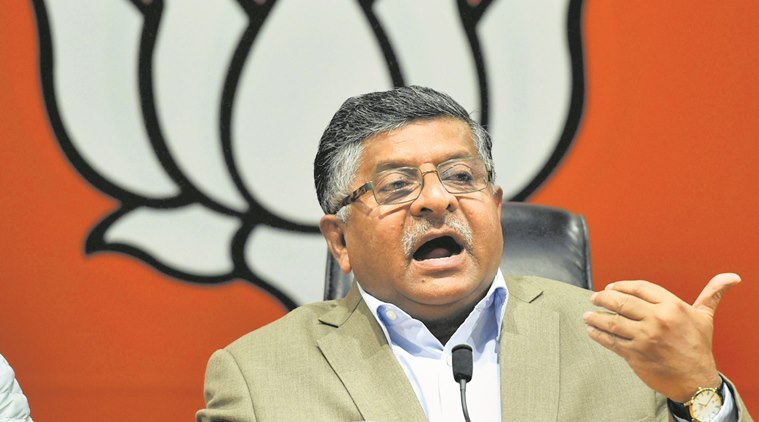Stay updated with the latest - Click here to follow us on Instagram
Ravi Shankar Prasad to introduce Bill to amend Aadhaar Act
The Cabinet in mid-December approved amendments that would permit voluntary use of Aadhaar for mobile SIM card and bank account authentication, and allow children who turn 18 to opt out of the system.
 Ravi Shankar Prasad in New Delhi. (PTI)
Ravi Shankar Prasad in New Delhi. (PTI)
Union Minister Ravi Shankar Prasad will introduce a bill in Lok Sabha tomorrow to amend the Aadhaar Act, the Indian Telegraph Act, and the Prevention of Money-laundering Act (PMLA).
The Cabinet approved amendments in mid-December that would permit the voluntary use of Aadhaar for mobile SIM card and bank account authentications, as well as allow children who turn 18 to opt-out of the system.
Prasad’s Aadhaar and Other Laws (Amendment) Bill continues the government’s push to establish a law that would be enable banks and telecom uses of the biometric identification system after a Supreme Court’s Aadhaar ruling in September struck down those provisions.
Month-wise UIDAI numbers indicate the Supreme Court ruling did not affect authentication rates significantly but did impact the number of e-KYC’s. While August saw more than 24 crore e-KYC’s, the numbers dipped by almost 70 percent to 7.8 crore in December of last year.
The UIDAI website shows banks such as State Bank of India and Yes Bank were in the top 10 Authentication User Agencies (AUA) with the highest number of authentication transactions and Bank of Baroda and Punjab National Bank were in the top 10 KYC User Agencies (KUA) with the most e-KYC’s transactions this month. Banks may be still using Aadhaar with offline authentication methods or for government services.
While the majority judgement upheld the mandatory use of Aadhaar for government services, it struck down the private uses of Aadhaar, stating, “We read down this provision to mean that such a purpose has to be backed by law. Further, whenever any such ‘law’ is made, it would be subject to judicial scrutiny.”
The judgement weighed the uses of Aadhaar according to three parameters laid out in a privacy proportionality from the Puttaswamy Supreme Court case. Any forthcoming law or contract would have to appeal to principle of proportionality as well. In effect, the apex court struck down a Department of Telecommunications (DoT) circular from 2017 that mandated Aadhaar-based authentications or re-verifications for mobile numbers. The DoT directed the telecom operators to stop Aadhaar-based e-KYC in October.
In a November interview with the Indian Express, Ajay Bhushan Pandey, CEO, Unique Identification Authority of India said that telecom operators stopped Aadhaar-based authentications and have switched over to an offline method. Since April, UIDAI has been encouraging banks and telecoms to use an offline authentication Aadhaar method in which the card holder downloads a document from the UIDAI website with his/her photograph and a QR code. Because the document does not include the Aadhaar number or biometric data, the Attorney General cleared the offline model as constitutionally sound after the Supreme Court ruling.
In addition to the DoT circular, the PMLA Rules were amended in 2017 to make bank accounts and other financial matters such as insurance policies and credit cards mandatorily linked to Aadhaar. Because both the DoT circular and the PMLA rules did not stand up to the Puttaswamy proportionality test and were not backed by law, the bench struck them down in the landmark case.
While the Aadhaar Act controversially bypassed the Rajya Sabha by its categorisation as a money bill, this Aadhaar Amendment Act will have to pass through the Rajya Sabha, where the government does not have a majority. The Supreme Court ruling on Aadhaar upheld the validity of the Aadhaar Act’s passage as a money bill.







